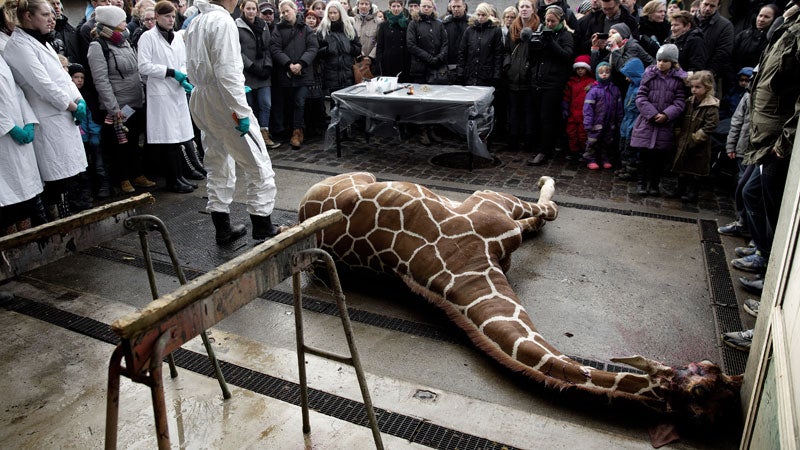The decision to kill a healthy two-year-old giraffe in a Danish zoo, in order to prevent inbreeding, has garnered international outrage and a top spot on Google News. Meanwhile, poachers throughout Asia and Africa slaughter wild elephants, rhinos, and other charismatic megafauna on the regular, all to feed the greed machine with their byproducts, such as ivory.
Granted, wildlife crime has been receiving a fair amount of news coverage—largely owing to the fact that poaching is bringing some species to the brink of extinction. Curbing the epidemic, spurred by a spike in demand for ivory, is proving a Herculean task. Combined, wildlife crime and forest crime (illegal logging and other fauna extraction) represent an illicit $17 billion trade, according to . Only the illicit markets for drugs, counterfeits, human trafficking and oil are larger.
Wildlife and forest crimes tend to go unchecked because large international crime syndicates and warlords often commit them. (In the Democratic Republic of Congo, for example, poachers have been linked to Joseph Kony’s Lord’s Resistance Army.) Would you want to come up against one of these groups for reporting poachers? Didn’t think so. But a group of NGOs and wildlife advocacy groups, with funding from the UK-based , have launched that they hope will provide whistleblowers a safe place to report wildlife and forest crimes.
The website (its name a nod to Wikileaks) uses a secure, encrypted transmission system that allows tipsters to submit information either confidentially or anonymously. Confidential submissions can’t be traced to their sources by third parties, but government entities could trace the IP address. Anonymous submissions are made using a software called Tor, which uses a chain of proxies and encrypted data to obscure the sender’s origin.
Andrea Crosta, project leader of WildLeaks and co-founder of Elephant Action League: “Our first priority is to facilitate the identification of criminals and corrupt governmental officials behind the poaching and trafficking of endangered species such as ivory, rhino horn, big cats, apes, pangolins and birds, as well as forest products. But we also put a lot of effort into protecting the people who chose to send us information, not only by providing a state-of-the-art secure system but also by managing and using the information in the correct way.”
Other organizations behind WildLeaks includes EcoJust, a Dutch consultancy that works with NGOs and governments to address global trafficking of endangered species; the South Africa-based Oxpeckers Center for Investigative Environmental Journalism, which specializes in data analysis and mapping techniques to track poaching; UK-based environmental investigation agency, an independent groups that works to solve environmental crimes; and a US-based investigative journalism network called 100 Reporters.


